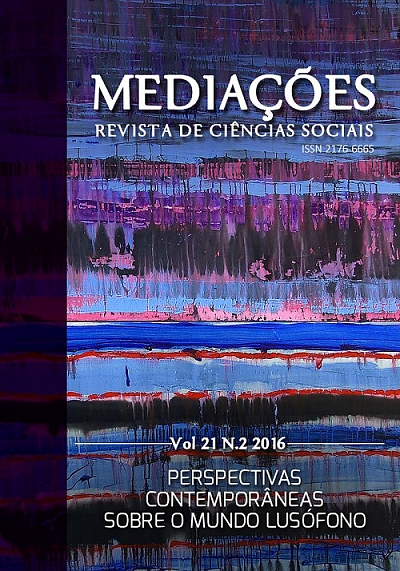Religious territories in Portugal
DOI:
https://doi.org/10.5433/2176-6665.2016v21n2p197Keywords:
Religion, Territories, MobilityAbstract
Each religious group has its temporality and features spatial regularities and, in similarity to what is happening elsewhere, the empirical findings show that urbanity, mobility and even cosmopolitanism do not correlate exclusively with secularization indicators but also with the plurality of religious (and non-religious) identities, beliefs and experiences. The study of the Portuguese Religious Identities (IRP) of 2011 and the census of that year indicate that the non-Catholic religious groups (particularly the Evangelical ones) almost doubled during the period of a decade. Who are these minorities, when and where was its implementation in Portuguese society, are questions that will have sought to be answered in this article.Downloads
References
BEYER, P. Privatization and the Public Influence of Religion in Global Society. In: M.Fearthstone (Ed.). Global Culture: Rationalism, Globalization and Modernity. London: Sage, 1990, p. 373-395.
CASANOVA, J. The Religious Situation in Europe. In: JOAS, H; KLAUS, L. (Eds.). Secularization and the World Religions. Liverpool: Liverpool University Press, 2009, p. 207-227.
ESTEVES, A.J. A religião popular em Portugal. Cadernos de Ciências Sociais, n. 4, p. 63-73, 1986.
CESOP. Identidades religiosas em Portugal: representações, valores e práticas, Região Autónoma dos Açores - Relatório Estatístico, Lisboa, Universidade Católica Portuguesa: CESOP, 2012.
COUTINHO, José Pereira. Clusters of Religiosity of Portuguese Undergraduate Youth. Sociologia, Problemas e Práticas, n. 75, p.109-130, 2014.
DAVIE, Grace. Religion in Britain since 1945: A Persisting Paradox. Oxford: WileyBlackwell, 2015.
DAVIE, G. Religion in Modern Europe: A Memory Mutates. Oxford: Oxford University Press, 2000.
FERNANDES, António Teixeira. Fátima e o poder político. Porto: Estratégias Criativas, 2013.
FONSECA, Maria Lucinda. Imigrantes de leste nas áreas rurais portuguesas: o caso do Alentejo central. Comunicação apresentada na Conferência Imigração de Leste - Uma Nova Realidade: Oportunidades e Desafios. Lisboa: Fundação Calouste Gulbenkian, Universidade de Lisboa: Centro de Estudos Geográficos, [URL] www.ceg.ul.pt/migrare/events/ImigLesteLF.htm . Acesso em: 14 out. 2010.
GRACINO JUNIOR, Paulo. A demanda por deuses: Globalização, fluxos religiosos e culturas locais nos dois lados do Atlântico. Rio de Janeiro: Universidade do Estado do Rio de Janeiro, 2016.
GUICHARD, François. Le Protestantisme au Portugal. In: Arquivos do Centro Cultural :Português. Lisboa-Paris: Fundação Calouste Gulbenkian, v. 25, 1990, p. 455-482.
MARTIN, David. On Secularization: Towards a Revised General Theory. Farnham: Ashgate, 2005.
MARTIN, David. A General Theory of Secularization. Oxford: Blackwell, 1978.
PINTO, Pedro. A implantação das testemunhas de Jeová em Portugal e no Ultramar português (1925-1974). Lusitania Sacra, n. 25, p. 127-179, 2012.
RODRIGUES, Donizete. O evangélico imigrante: o pentecostalismo brasileiro salvando a América. São Paulo: Fonte Editorial, 2016.
RODRIGUES, Donizete; RUUTH, Anders. Deus, o Demónio e o Homem: O Fenómeno Igreja Universal do Reino de Deus. Lisboa: Colibri, 1999.
TEIXEIRA, Alfredo (coord.). Identidades religiosas em Portugal: representações, valores e práticas - Relatório. Lisboa: Universidade Católica Portuguesa (CESOP e CERC), 2012.
TESTA, Michael. O Apóstolo da Madeira (Dr. Robert Reid Kalley). S/l: Igreja Evangélica Presbiteriana de Portugal, 1963.
VILAÇA, Helena. Novas paisagens religiosas em Portugal: do centro às margens. Didaskalia v. 43, n. 1, p. 81-114, 2003.
VILAÇA, Helena. Da torre de Babel às terras prometidas: o pluralismo religioso em Portugal. Porto: Afrontamento, 2006.
VILAÇA, Helena. Notas de pesquisa para o estudo dos grupos religiosos
minoritários em Portugal. Sociologia, n. 7, p. 31-51, 1997.
WILSON, Bryan; DOBBELAERE Karel. Jehovah's Witnesses in a Catholic Country: A Survey in Nine Belgian Congregations. In WILSON, Bryan (Ed.). The Social Dimensions of Sectarianism: Sects and New Religious Movements in Contemporary Society. Oxford: Oxford University Press, 1990, p. 149-175.
Downloads
Published
How to Cite
Issue
Section
License
Copyright (c) 2016 Helena Villaça

This work is licensed under a Creative Commons Attribution 4.0 International License.
Copyright on articles published in Mediações belongs to the author(s): in the case of partial or entire republication of the original publication, we ask author(s) to indicate the original publication in the periodical.
Mediações uses the Creative Commons Attribution 4.0 International license, which allows Open Access, enabling any user to read, download, copy and disseminate its content so long as adequately referenced.
The opinions expressed by the author(s) are their sole responsibility.

































